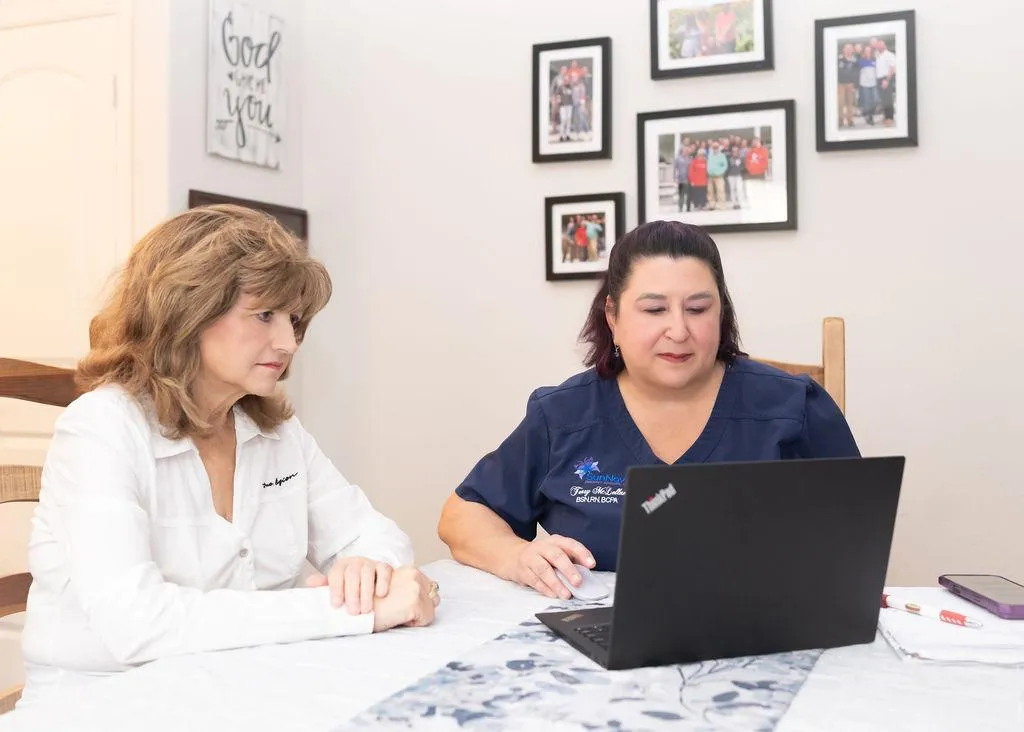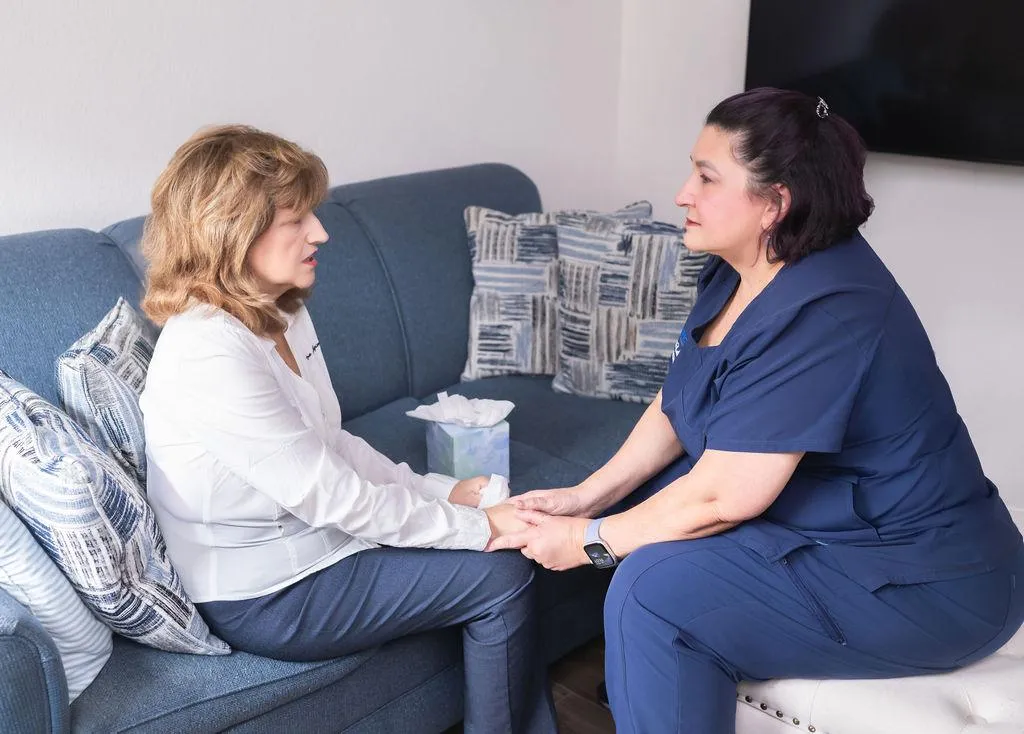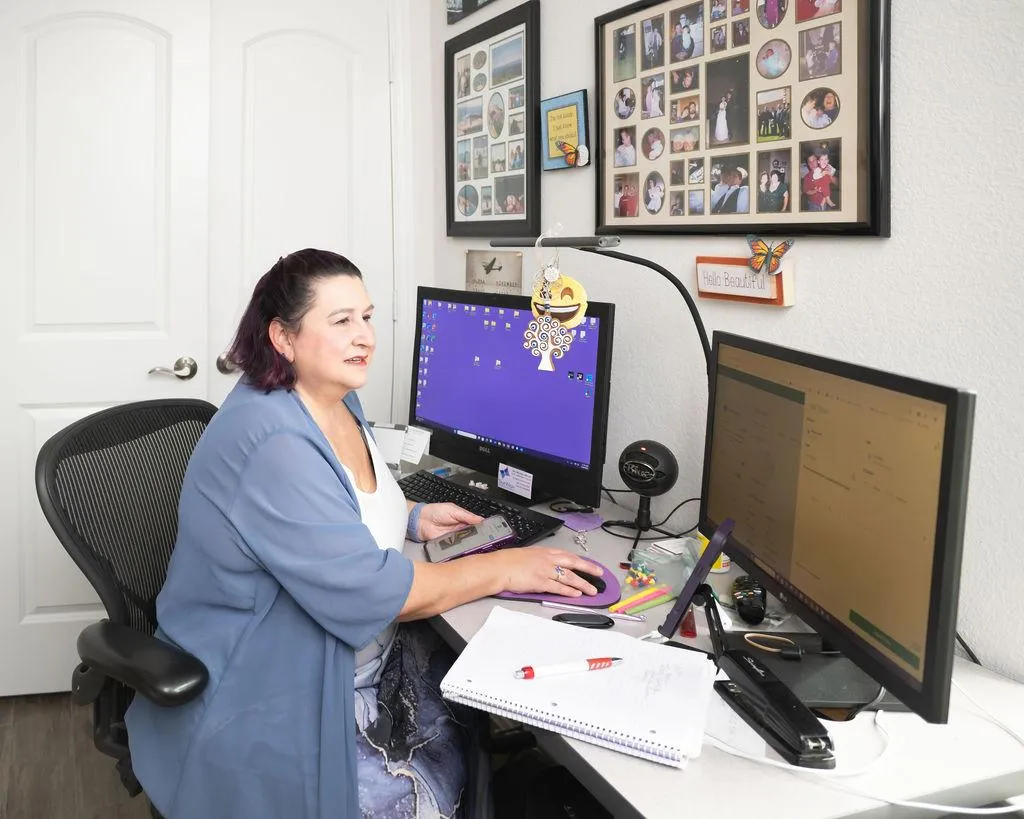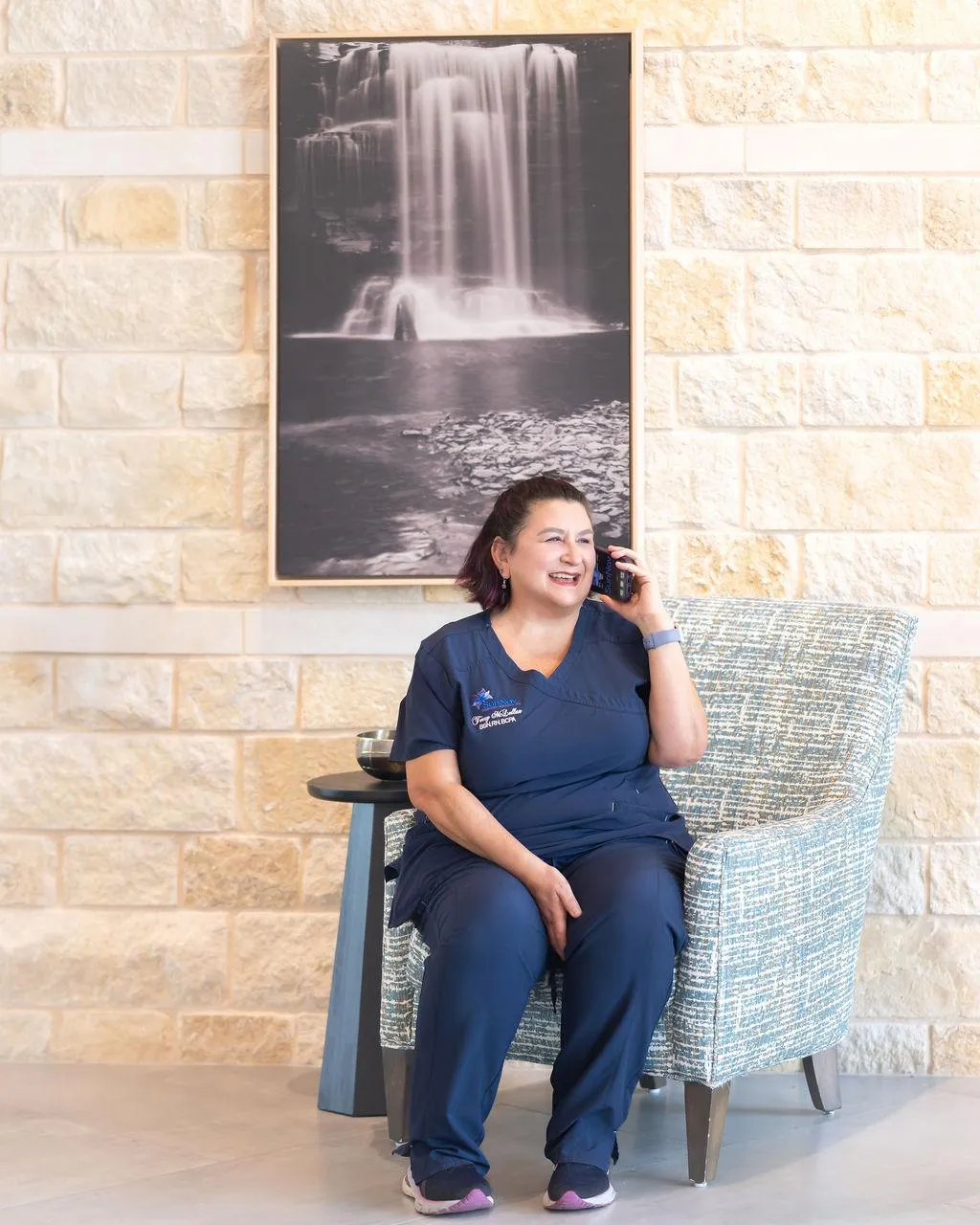Struggling in a healthcare crisis? Click here now →


Supporting Your Loved One Through Breast Cancer: When Advocacy Matters Most
Supporting Your Loved One Through Breast Cancer: When Advocacy Matters Most
Understanding the Journey Ahead

One in eight women in the United States will be diagnosed with breast cancer in their lifetime.
When that diagnosis affects someone you love, your world shifts in an instant. The path ahead feels uncertain, overwhelming, and filled with medical terminology that sounds like a foreign language.
October marks Breast Cancer Awareness Month, a time when we think about prevention and screening. But for families already navigating a breast cancer diagnosis, this month serves as a reminder of something equally important: the critical role that support and advocacy play in the cancer journey.
If your loved one has been diagnosed with breast cancer, you're likely asking yourself how you can help.
The answer isn't always straightforward, but understanding when and how to advocate can make a profound difference in their care, recovery, and overall experience.
The Unique Challenges of Breast Cancer Navigation
Breast cancer treatment is rarely a simple, linear process.
It often involves multiple specialists (oncologists, surgeons, radiologists, and reconstruction specialists), each with their own treatment protocols and communication styles. Appointments pile up quickly, test results need to be tracked, and treatment decisions must be made on timelines that can feel rushed.
For the patient, processing the emotional weight of a cancer diagnosis while simultaneously managing complex medical logistics is exhausting. This is where caregivers and family members become essential advocates, but it's also where many find themselves struggling to keep up.

The Medical Complexity
Breast cancer treatment plans can include surgery, chemotherapy, radiation therapy, hormone therapy, targeted drug therapy, or combinations of these approaches. Each treatment comes with its own set of side effects, scheduling requirements, and follow-up protocols.
Understanding which specialists need to be consulted, what questions to ask at each appointment, and how to coordinate care between different medical teams requires knowledge that most families simply don't have.
When you're supporting someone through breast cancer, you're suddenly expected to become fluent in medical terminology while also managing the emotional and practical aspects of caregiving.
The Financial Burden
About 270,000 women are diagnosed with breast cancer each year in the United States.
Each of these diagnoses brings not just medical challenges but significant financial concerns. Cancer treatment is expensive, even with insurance. Bills arrive from multiple providers, insurance explanations of benefits are confusing, and out-of-pocket costs add up quickly.
Many families don't realize that medical billing errors are common in cancer care, where the complexity of treatments and the involvement of multiple providers create numerous opportunities for mistakes.
Reviewing and challenging these errors requires time and expertise that caregivers often lack while managing everything else.
"Supporting someone through cancer means being their voice when the healthcare system becomes too overwhelming to navigate alone."
How to Support Your Loved One: Practical Strategies
Being an effective advocate for someone with breast cancer means understanding both the emotional and practical support they need.
Here are specific ways you can help:
Become an Active Listener at Medical Appointments
Patients often struggle to absorb information during appointments, especially after hearing difficult news or while dealing with treatment side effects.
Attending appointments with your loved one allows you to take detailed notes about treatment recommendations, ask clarifying questions when medical terminology is confusing, remember instructions that might be forgotten in the stress of the moment, and provide a second set of ears for complex information.
Consider bringing a notebook or using your phone to record appointment notes (with permission).
Write down medication names, dosages, and specific instructions. Don't hesitate to ask doctors to repeat information or explain terms you don't understand.
Coordinate Care Between Providers
One of the most challenging aspects of breast cancer treatment is ensuring that all medical providers are communicating effectively.
Your loved one might see an oncologist, surgeon, primary care physician, and various specialists, but these providers don't always share information seamlessly.
You can help by maintaining a centralized record of all medical appointments and test results. Ensure each provider has current information about treatments from other specialists. Follow up on referrals and make sure appointments are scheduled appropriately. Ask whether test results have been shared with all relevant providers.
Manage the Administrative Burden
The paperwork associated with cancer treatment can be overwhelming.
Insurance claims, prior authorizations, billing statements, and medical records all require attention at a time when your loved one needs to focus on healing.
Taking responsibility for administrative tasks can significantly reduce stress. This includes reviewing medical bills for accuracy, following up on insurance claims, organizing medical records, and maintaining a system for tracking important documents.
Provide Emotional Support Without Overwhelming
While practical support is crucial, emotional support matters just as much.
However, it's important to offer support in ways that feel helpful rather than intrusive. Some people want to talk extensively about their diagnosis and treatment, while others prefer to focus on other topics.
Ask your loved one what kind of support feels most helpful to them.
Respect their boundaries while making it clear that you're available whenever they need you. Sometimes the most powerful support is simply being present without trying to fix everything.
"You don't need to have all the answers. You just need to show up and be present."

When to Consider Professional Patient Advocacy
There comes a point in many cancer journeys when the complexity of care exceeds what families can reasonably manage on their own.
Recognizing when you need additional support isn't a failure. It's a smart decision that can significantly improve outcomes and quality of life.
Signs You Might Benefit from a Healthcare Advocate
Consider reaching out to professional patient advocates like SunNav Healthcare Advocates when:
Treatment coordination becomes overwhelming. If your loved one is seeing multiple specialists and you're struggling to keep track of appointments, test results, and treatment recommendations, an advocate can provide essential coordination support.
Medical bills are confusing or contain errors. Cancer treatment generates significant medical billing, and errors are common. If you're unsure whether bills are accurate or if insurance claims are being processed correctly, professional billing review can save thousands of dollars.
Communication with healthcare providers is challenging. When you're not getting clear answers to your questions, when providers seem rushed or dismissive, or when you suspect your loved one isn't receiving appropriate care, an advocate can intervene on your behalf.
Insurance denials or prior authorization delays are impacting care. If insurance is denying coverage for recommended treatments or if prior authorization delays are preventing timely care, advocates who understand insurance systems can often resolve these issues more quickly.
The emotional and physical toll of caregiving is becoming unsustainable. Caregiver burnout is real and serious. When the demands of advocacy and care coordination are affecting your own health and wellbeing, it's time to bring in professional support.
Treatment decisions feel overwhelming. When facing complex treatment choices, having an advocate who can help you understand options, research facilities and specialists, and ask the right questions can bring clarity to difficult decisions.
"Knowing when to ask for help is one of the most important advocacy skills you can develop."

What Professional Advocacy Provides
At SunNav Healthcare Advocates, our services are specifically designed to address the unique challenges that families face during cancer care.
Medical Billing Review and Advocacy
We examine medical bills line by line, identify errors and overcharges, and work with providers and insurance companies to correct them. This service alone often saves families significant money during an already expensive time.
Care Coordination
We ensure that all providers are communicating effectively, that appointments are scheduled appropriately, and that nothing falls through the cracks. We become your central point of contact, managing the logistics so you can focus on emotional support.
Insurance Navigation
We help families understand their coverage, file appeals when claims are denied, and work through prior authorization requirements.
We know how to communicate with insurance companies in ways that get results.
Treatment Planning Support
We help families understand treatment options, research specialists and facilities, and make informed decisions. We attend appointments with you (virtually or in person) and ensure you're asking the right questions.
Crisis Advocacy
When unexpected complications arise or when you need someone to intervene immediately with healthcare providers, we're available to step in and advocate for appropriate, timely care.
The Power of the Support Team
Remember the testimony of the Wink family?
Their experience shows how having advocates in your corner can transform the healthcare experience. You can watch their story here: https://www.youtube.com/watch?v=Mtud2aX34m8
Their journey illustrates an important truth: you don't have to navigate complex medical situations alone.
Building a support team that includes both personal advocates (family and friends) and professional advocates (like SunNav Healthcare Advocates) creates a safety net that catches things before they become crises.
Moving Forward with Confidence
Supporting someone through breast cancer is one of the most challenging experiences you'll face.
The medical complexity, financial concerns, emotional weight, and time demands can feel impossible to manage. But with the right support and advocacy, you can navigate this journey with greater confidence and less stress.
You don't need to become an expert in oncology or medical billing.
You don't need to sacrifice your own wellbeing trying to manage everything alone. What you need is a team that includes both the people who love your family member and the professionals who have the expertise to advocate effectively within complex healthcare systems.
This Breast Cancer Awareness Month, take a moment to assess your support system.
If you're feeling overwhelmed by the demands of advocacy, if medical bills are piling up, or if you're simply not sure you're asking the right questions, reach out to SunNav Healthcare Advocates.
We're here to take on the battles with insurance companies, the coordination between specialists, and the review of complex medical bills so you can focus on what matters most: supporting your loved one through their healing journey.
Learn more about our services at https://sunnavhca.com/services, or contact us to discuss how we can support your family during this challenging time.
Remember: sometimes the best advocacy means knowing when to ask for help.
Resources for Breast Cancer Support:
National Breast Cancer Foundation: www.nationalbreastcancer.org
Susan G. Komen: www.komen.org
Living Beyond Breast Cancer: www.lbbc.org
American Cancer Society: www.cancer.org
"Advocacy isn't about doing everything yourself. It's about ensuring your loved one receives the care they deserve."
Disclaimer: We do not provide legal or financial advice. For such matters, please consult with a licensed professional. Referrals are available upon request but do not constitute an endorsement.
Note: We have been approved to bill Traditional Medicare as of 6/16/2025






